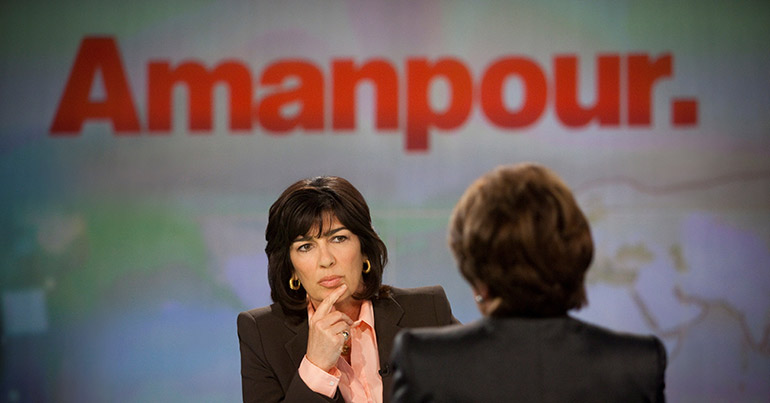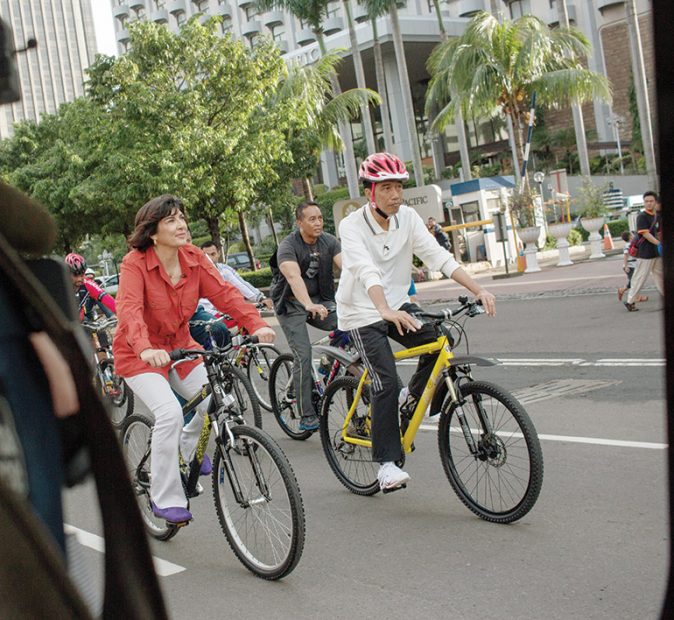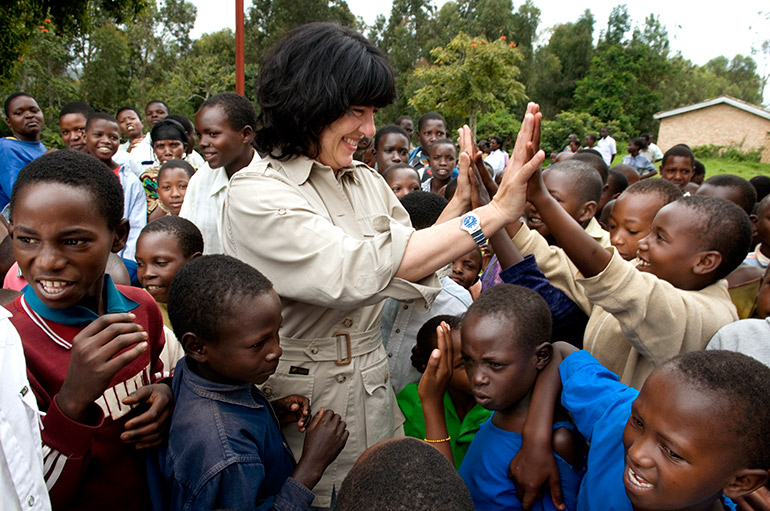Christiane Amanpour: “The only side I’m taking is the truth”
One of the world’s biggest names in journalism, Christiane Amanpour’s eponymous television news show has seen her duke it out with dictators and cross swords with spin doctors. The 58-year-old international correspondent discusses reporting on genocide, the 24/7 news cycle and why it’s a journalist’s duty to stand up for what’s right

Every evening, millions of CNN viewers across the globe tune into Christiane Amanpour’s primetime show, simply named Amanpour, for her trusted take on the political crises of the day.
She’s a seasoned international correspondent known for her tough, probing sit-downs with world leaders, such as confronting Russian Prime Minister Dmitry Medvedev with war crimes evidence from Syria and securing the final interview with former Libyan leader Muammar Gaddafi. Accustomed to holding politicians to account and drilling down to the core of issues, Amanpour has also been called a “game-changer” for forging a path as a war correspondent that enabled other female broadcast journalists to follow her lead.
After starting out as an assistant on CNN’s international assignment desk in Atlanta, US, the British-Iranian journalist quickly rose through the ranks. Her fearlessness is well documented – the New York Times once published a story headlined “When There’s War There’s Amanpour” – and she has covered conflicts in Iraq, the Balkans, Rwanda, Palestine and Sudan, as well as other war-torn regions.
On a number of occasions, she has interviewed some of Southeast Asia’s kingmakers, including Malaysian Prime Minister Najib Razak and Myanmar’s de facto leader Aung San Suu Kyi. She also travelled to Cambodia to film part of her 2008 documentary, Scream Bloody Murder, which examined mass atrocities in several countries.
Although the first Gulf War marked the beginning of her international career, it was her determination to make the world recognise the horrors of the Bosnian war in the early 1990s that cemented her place among the upper echelons of the foreign press corps.
Yet her coverage also garnered criticism from some fellow journalists, who accused her of lacking the objectivity expected of reporters – a charge she has robustly defended herself against, telling Southeast Asia Globe that “if you try to draw a false moral equivalent based on a false factual equivalent, certainly in those instances not only are you wrong and perpetrating lies but you are an accomplice… to the most grave violations of international humanitarian law”.
Speaking over the telephone from London, where her show is recorded, Amanpour came across as warm, engaged and deeply passionate about the intertwining threads of journalism and human rights.
As one of the world’s most recognisable journalists – and reputedly among the most highly paid – she acknowledges a “huge weight of responsibility” when reporting a story. Not because of her profile, but because of the global platform afforded to her by CNN: “That has such a big and deep and profound reach, I do feel that we have an enormous responsibility… to get the facts right.”

You have spoken before about the Bosnia conflict and how you considered that to be the most important story you have ever covered. Is that still the case?
Yes it is, and I’ll tell you why. The reason it remains the defining force of my professional life and, to an extent, my personal life, is because it taught me the fundamentals of our business – truth and objectivity – and in my life, of tolerance and seeking common ground between different ethnic groups… but also seeking common ground wherever I am. I learned that if you are incredibly intolerant it can have dangerous and bloody results, and that I learned in Bosnia. But the professional lesson was that you couldn’t be falsely neutral – you couldn’t equate one set of facts with a set of facts on the other side because they weren’t equal. You had one party to the war that had all the backing of the former Yugoslavia. It had the forces, it had the weaponry, it had the tanks, it had the agenda. And that side was waging a war of ethnic cleansing that developed into genocide as defined by the International Criminal Tribunal in The Hague… What they wanted to do was create an ethnically pure zone for themselves, the Bosnian Serbs.
So when people were sometimes uncomfortable because the West did not want to step in and stop the war, and people were uncomfortable with the fact we were telling these very human stories every single day and putting it under the noses of our viewers but also of world leaders, particularly in the West, who were sitting on their hands… and trying to say that we couldn’t do anything because all sides were equally guilty – well, we were saying no, not all sides were equally guilty, and when I was criticised for quote-unquote ‘taking sides’, I said: ‘I’m not taking sides, the only side I’m taking is the truth.’
You have explored the issue of genocide on a number of occasions since Bosnia – how affecting were the stories that you heard when you came to Cambodia a few years ago?
It was incredibly affecting to come to Cambodia, and it was the first time I’d been there. Obviously I had read so much, so many of the great journalists’ books, so much of the history of what happened. To be confronted with the facts and the reality all those years later, to see the Killing Fields and the memorial that had been built, to be able to go into… Tuol Sleng prison in Phnom Penh and… interview a prisoner who managed to survive and had painted a lot of what he was seeing on the walls of the prison – to see that all those years later was pretty incredible.
It is to my mind so vital to speak the truth and to try to speak truth to power. There is no ‘on the other hand’ when you get to genocide, there just isn’t – there’s no counter-balance. When people say to me: ‘Well, don’t you think you’re being a little bit harsh?’ I say: ‘Well, listen, flip me back 70 years to Nazi rule and what would I have had to say about Hitler? That, oh, maybe he had a point? Or maybe we should take into consideration his view?’ No. I refuse to be that [kind of journalist]. I do not draw false moral equivalents nor false evidentiary equivalents… There are some stories in which the very essence of our value system, of international humanitarian law, of international law itself, are so assaulted that you have to stand up for the truth. And for what’s right. And I believe that that’s our duty as well as anything else as a journalist.
You spoke prior to the Myanmar election last year about your fascination with that country. And it is really a story that is evolving right now with Aung San Suu Kyi’s party having taken power. What do you think of the way she is handling the Rohingya issue?
I have a huge amount of admiration for what the democrats in Myanmar, Burma, have achieved, and the incredible personal sacrifice that they have had to suffer… in order to achieve democracy and freedom. I also, quite frankly, have respect for the military leaders who finally understood they had to accept the will of the people and who were finally able to enter negotiations with Aung San Suu Kyi to the point where she is now the de facto ruler of Myanmar… [She] is in a position where her unbesmirched moral credentials and her incredible moral standing is under some cloud right now because the rest of the world is looking in and wondering why she’s not speaking up for the Rohingya, and she doesn’t – she asks that they’re not even called Rohingya.

So obviously there is a massive political problem in Myanmar, Burma, and I hope that common sense and common humanity will prevail above politics to treat a minority of that size, or any size, with the human rights and the political rights that they deserve and need, and that’s what I believe… Although I admire her so much, I would always ask her and press her on that point.
You can’t be a little bit human rights. You either believe in people’s human rights or you don’t.
You must have seen some huge changes in journalism during your career. What do you think of today’s 24-hour news cycle? Do you think it’s a good thing?
I’m proud that CNN [founder] Ted Turner really launched that concept. And he did. Ted Turner created the idea of 24/7 television news. Obviously BBC World Service Radio had it, but when it comes to television news, and as you know most people get their, well, at least did get their news from television rather than radio or print press – obviously now online is taking over – but television has a massive, massive powerful influence around the world. I think, for the most part, we’ve been a force for good. Whatever it is… from the fall of the Berlin Wall all the way to the [EU] referendum here in the UK, and points in between and beyond, we’ve done an amazing job in bringing that information to people.
But I do worry sometimes that the demand and the speed and the tone of 24/7 is being overtaken by social media, by online, and I do worry that in this environment that we find ourselves in now, the loudest voice wins, the most extreme voice is heard. I do believe we need to also step back and, as a main part of our reportage, we need to be out there, with our cameras, with our reporting in the field, and still make that a huge part of our offering to people. Because we just can’t rely on screeching talking heads who all have an agenda, who all have a political agenda, who are all biased towards their own side.
You mentioned field reporting. How much are you thinking about your personal safety when you are reporting from conflict zones?
I’ve spent 20-odd years in the most dangerous parts of the world, and I sort of run to them rather than run against them; that’s what we do as foreign correspondents… But the danger has absolutely, exponentially increased to a point where it has had a chilling effect. Syria is the most important example. I believe that, had we journalists been in Syria doing the same kind of reporting that we did in Bosnia, the political reality… would be much different. I do not believe that our Western leaders, people who regard themselves as upholding a world order, human rights, people’s rights, could allow the wholesale slaughter to continue if we were able to show this as we did in Bosnia.
Because in Bosnia, eventually, they couldn’t allow it to continue any more, and they did intervene, and there was peace and there still is peace in the Balkans. And I believe we journalists played a huge role in enforcing that. And we haven’t been able to do so in Syria because of Isis. So it’s had a chilling effect on the ground, it’s had a chilling effect in terms of reportage, it’s had a chilling effect in terms of not holding our politicians and our world leaders’ feet to the fire, and it’s had a tragic consequence on the people of Syria, on the refugees, on terrorism and on the destabilisation of our world as we see it today.
When you go into a conflict zone, what kinds of stories are you looking for? And does being a woman perhaps influence the way you approach a story and the perspective you bring?
While I have a huge amount of respect for the half of the population that is of the male gender, I do believe we need a lot more women in positions of power, influence and reporting. You can see it happening a lot in my profession. There are a lot more women getting to be reporters, be camera people, be producers. We still need women in the executive suite and women making strong decisions. Because, frankly, you look at the mess we’re in all over the world, and it’s about time that we let half the population have their say and see whether they can do a better job in politics and all the way down.
When it comes to reporting, I believe being a woman has actually helped me and has never hindered me. It has allowed me to get into spaces that males couldn’t get into easily, particularly in the post-9/11 world, where we’re dealing with the Islamic world and the gender bias, the patriarchal society. And, as a woman, I’ve been able to talk to other women in the field, you know, mothers and daughters and sisters and just ordinary people, take my cameras in with my female crew and be able to tell human stories, whereby I might not have been able to in the past.

